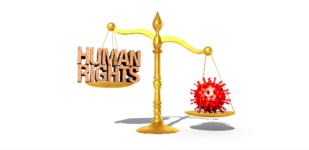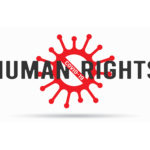COVID-19 and the Global Shift Towards Authoritarian Governance

Despite recurring lockdowns globally, COVID-19 continues to plague the planet. The pandemic toll on 29 January 2021 stands at 101 million cases worldwide, 56 million recoveries, and 2.19 million deaths as a result of the virus.
On 31 December 2019, the World Health Organisation announced a pneumonia of unknown kind had been detected in the Chinese city of Wuhan. While on 11 March last year, the WHO declared that the outbreak of highly contagious COVID-19 had become a global pandemic.
This crisis has led to mass unemployment and economic downturn, resulting from governments enforcing restrictions to curb transmission. And while human rights treaties permit the emergency limiting of certain freedoms, a recent paper warns that the COVID-19 response has surpassed this.
“As governments attempt to deal with the many adversities that the pandemic presents, there are alarming regressions toward authoritarian governance,” two Hong Kong University professors write.
“A public health emergency does not, however, give license to governments to cast aside their obligations to uphold fundamental rights and liberties.”
Indeed, the academics posit that the pandemic has led governments, including liberal democracies, to enforce draconian measures that often overstep any public health need.
And this has been marked by breaches of civil liberties, highly concentrated decision-making and “vertical, paternalistic power”.
Questionable responses
Published last September by Oxford University’s Journal of Law and Biosciences, the COVID-19 Emergency Measures and the Impending Authoritarian Pandemic is written by associate professor of law Stephen Thomson and associate professor of medical ethics and law Eric C Ip.
The authors explain that the WHO was expecting a “disease X”, however it’s “abundantly clear” that governments weren’t. And the scramble to deal with the virus has seen authoritarianism manifest in three ways: restrictions on personal movement, surveillance, and regression in healthcare ethics.
On movement restrictions, the paper focuses on the prohibition against being permitted out of one’s house without “a reasonable excuse”. Similar to the Australian experience, the UK had police enforcing this restriction with a list of excuses that applied.
This situation led to widespread confusion amongst the enforcers and the public, regarding what was actually permissible within the realm of stipulated excuses, especially when the illegal restrictions were coupled with pandemic measures, such as social distancing, that weren’t unlawful.
A much more extreme form of this reasonable excuse scenario occurred in France, where a person had to carry a typed note around with them outlining their excuse for being outside of their home, along with the details of the time that they’d left.
In terms of surveillance, the report turns to South Korea, where a website was created displaying the movements of an infectious person prior to diagnosis. Complied via electronic data, the site provided enough details to identify a person and led to widespread stigmatisation.
And regarding a decline in healthcare ethics, the academics point to a case in Wales where a clinic sent out a letter to patients with serious conditions asking them to sign a form advising medical staff not to attempt to resuscitate them if their health deteriorated as a result of contracting COVID-19.
Excessive measures
“The adoption of excessive and disproportionate emergency measures” have been a hallmark of the pandemic, according to the report authors. These have undermined human rights, and have been rolled out within semi-authoritarian states, as well as liberal democracies.
On the authoritarian side, Cambodia enacted emergency powers that allowed for the surveillance of all telecommunications and the control of media broadcasts. It created offences with steep penalties around obstructing operations and left it open for these measures to be applied again in the future.
While Bosnia and Herzegovina implemented curfews on an indefinite basis, the online publication of the names of those isolating, as well as the quarantining of migrant centres, based on claims they were hotspots, despite no reported cases of a migrant having been diagnosed with COVID-19.
On the democratic side, the Scottish government attempted to dispense with the requirement of a jury to hear serious criminal cases. Although, the use of video links saw this measure dropped. And it’s noted that provisions within Scottish law would likely have prevented the proposal in the end.
Concentrated decision-making
Another distinct feature of the pandemic response has been the “suspension of effective democratic controls on government”, which has left the very few in a position to make decisions for all.
The UK government has claimed its been making decisions based on “following the science”. But the report authors counter this by pointing out that a scientific consensus doesn’t exist, the government hasn’t consulted experts in other fields, while other elected officials haven’t been consulted.
In this country, the Morrison government closed down parliament. It established the national cabinet, made up of the PM, state premiers and territory chief ministers, which has deliberated on national responses.
And the prime minister also created a non-elected corporate body to oversee the economic recovery.
While over in Hungary, the government enacted a law that permitted the suspension of the enforcement of existing laws and statutory requirements in order to implement extraordinary measures by decree for the purposes of eliminating the virus. And this law had no sunset clause.
Creeping authoritarianism
The Hong Kong law professors further note that the onset of the pandemic coincided with a downturn in freedoms globally. In January last year, the Economist Intelligence Unit’s 2019 Democracy Index recorded the worst global democratic score since it was established in 2006.
The Oxford University Press paper also takes aim at the WHO, condemning the international body for making no judgements upon the pandemic measures being taken and their human rights implications.
The concern is that the measures that have been rolled out for the prevention of the virus may not be pulled back. This includes the increasing reliance on electronic surveillance, the denial of human autonomy, as well as the sacrifice of the individual for the national interest.
Australian citizens are well aware of the enhanced presence of police on the streets during the pandemic, which has been accompanied by a rise in incidents involving the use of force by officers.
There was the decking out of the Victoria police riot squad in military-style gear at the Queen Victoria Markets in response to anti-lockdown protesters. And the silencing of dissenting demonstrations in general by NSW police long after other restrictions had been removed.
A constitutional pandemic
The report warns that “a transnational constitutional pandemic is coming of age”, which is marked by the prioritisation of the containment of COVID-19, regardless of any resulting reduction in healthcare ethics and human dignity, as well as rights violations.
The professors emphasise that they are not suggesting a complete laissez-faire approach to the pandemic as has been the case in Sweden, but rather they’re calling for a more measured response that does not involve the erosion of liberal democratic values and institutions.
“An authoritarian response to a biomedical pandemic is not, and never will be, a humanitarian solution,” the authors conclude the paper.







